From improving exercise performance to increasing muscle mass, creatine is the go-to supplement for athletes, bodybuilders, and gym-goers looking to step up their workout and maximize results. (1) And with hundreds of studies proving just how good it is, creatine doesn’t disappoint as long as you put in the work. (1) But since it’s backed by science and in high demand, the market is flooded with creatine supplements.
Our experts in nutrition and fitness want to help you in your search for the best creatine powder by providing honest reviews of popular supplement brands and products. In this Jacked Factory Creatine Monohydrate review, we examine the supplement’s ingredients, effectiveness, price, and more to see how well it complies with the science and compares to its competitors.
Medical disclaimer: This article is intended for educational and informational purposes only. It is not intended as a substitute for medical advice. For health advice, contact a licensed healthcare provider.
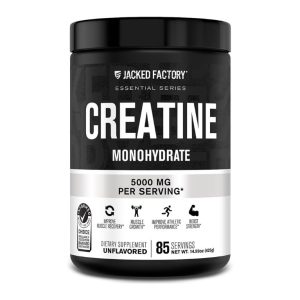

Key product features
What you should know
Jacked Factory Creatine Monohydrate is a high-quality supplement at an affordable price, supplying 5 grams of creatine per scoop.
- Jacked Factory Creatine Monohydrate keeps it simple with its one-ingredient, unflavored supplement aimed at supporting muscle growth and endurance for high-demand fitness training.
- At $0.35 per serving, Jacked Factory’s creatine powder is priced at the lower end of the average market price, making it a budget-friendly dietary supplement.
- This is a great supplement for athletes who want an effective high-quality creatine powder they can mix into their favorite protein shake.
- The creatine monohydrate powder is Informed Choice Certified and free of banned substances, crucial for athletes in sports that require drug testing.
Jacked Factory Creatine Monohydrate overview
On the official Jacked Factory website, the Creatine Monohydrate powder is a post-workout product aimed at increasing strength, power, endurance, and muscle growth. It’s unflavored and mixes well with any liquid, and Jacked Factory suggests stacking it with your protein powder, pre-workout, or branch-chained amino acid (BCAA) supplement.
Due to its ergogenic properties and ability to support post-workout recovery and muscle growth, Jacked Factory says creatine monohydrate is a must-have for any active individual who wants to step up their game. (2)
Let’s take a closer look at the supplement and see how it measures up to claims and research.
Jacked Factory Creatine Monohydrate ingredients
One of the most notable aspects of the Jacked Factory Creatine Monohydrate powder is its simplicity. As promised by the supplement maker, the powdered supplement has zero fillers or dyes with only one research-backed ingredient: creatine monohydrate.
Creatine is a molecule stored in muscle cells that supports production of adenosine triphosphate (ATP), your cell’s main source of energy. (2) Due to daily use and storage limitations, your body needs 1-3 grams of creatine a day to maintain normal storage needs for energy production and more if you exercise. (2)
Your body makes some creatine, but about half of what you need comes from your diet, mostly from animal-based foods like meat and fish. (2) Though not essential for everyone, some people are unable to make creatine due to inborn metabolic errors or can’t get enough because of diet preferences (vegetarians) or elevated needs (athletes in training), benefitting from supplementation. (2)
Creatine supplements come in many forms, such as creatine anhydrous, creatine hydrochloride, or creatine ethyl ester. (2) However, most studies evaluating the potential benefits of creatine used creatine monohydrate, which is considered the gold standard and the form recommended by sports nutrition experts. Supplement makers may use other forms of creatine, claiming that they dissolve or absorb better, but there’s not enough evidence to support these claims that they work better than creatine monohydrate. (2)
Many popular sport supplement makers use micronized creatine monohydrate, which is creatine monohydrate powder processed into smaller particles, so it dissolves better in water. But, there’s no evidence that the micronized version of the creatine powder works better than the regular powder. (3)
The Jacked Factory supplement is pure creatine monohydrate powder and nothing else, making it a good choice for those looking for a simple, single-ingredient creatine supplement to improve athletic performance.
If you’re looking for a more complete supplement with more than creatine, you may consider Nitrosurge Build, a popular pre-workout supplement by Jacked Factory with energy boosters like caffeine and beta-alanine, along with creatine. However, the pre-workout uses creatine hydrochloride, a form supplement makers claim is more absorbable than creatine monohydrate; but the research to back this claim isn’t there, and you only get 1 gram of creatine per serving. (4)
Dosing and use
You get 5 grams of creatine monohydrate per serving in the Jacked Factory supplement. The creatine dosing protocol for exercise and muscle growth suggests starting with a loading dose of 20 to 25 grams―divided into four doses—a day for seven days, quickly saturating the muscles with creatine. (2) Then, take 5 grams of creatine a day to maintain levels. (2)
You can skip the loading phase and start with the maintenance dose, but muscle saturation takes longer. (2, 5) Studies show that taking a lower dose of 3 grams of creatine a day for 28 days has the same outcome as taking a loading-phase dose of 20 grams for six days. Skipping the loading phase will also reduce the likelihood of experiencing gastrointestinal side effects. (10)
Jacked Factory creatine monohydrate powder provides an effective dose for loading and then maintaining the higher levels of creatine in the cell. Increasing muscle cell creatine boosts ATP production, so you can workout harder and longer, helping you reach and exceed your fitness goals. (6)
Jacked Factory recommends mixing the dietary supplement in 8 to 10 ounces of water and taking the supplement 1-3 times daily. Combining creatine with a carbohydrate or a carbohydrate and protein—such as mixing the creatine powder with your protein shake—may enhance creatine retention, according to the International Society of Sports Nutrition (ISSN). (2) However, more research is needed to confirm this. Drinking your supplement as close to the time you exercise—right before, during, or immediately, after—may also increase creatine muscle loading. (7)
Jacked Factory’s pure creatine powder is only available unflavored and may not work for individuals who prefer flavored supplements. But, its lack of flavor makes it a versatile supplement you can add to any liquid, shake, or smoothie without changing the taste.
Testing and certifications
Jacked Factory Creatine Monohydrate is produced in a current Good Manufacturing Practices (cGMP) facility as required by the FDA to ensure quality and safety of the sports supplement.
It’s up to the manufacturer of the supplement to ensure their product is safe and contains the ingredients listed on the label. (8) The FDA periodically inspects facilities that make dietary supplements, but they don’t test supplements. (8)
When evaluating supplement safety, we look for third-party testing, which is an independent lab test that checks ingredients and doses, making sure it matches the label. Jacked Factory creatine supplement is Informed Choice Certified and tested for banned substances in sports, such as anabolic steroids and amphetamines. (9)
The Informed Choice certification makes the Jacked Factory supplement safe for athletes who play sports that test for banned substances. However, the creatine monohydrate powder isn’t third-party tested for potency.
Jacked Factory creatine side effects
Creatine supplements are safe and well-tolerated by most people. However, some may complain of bloating when taking creatine supplements like the one from Jacked Factory. (10)
Creatine is osmotically active, meaning it draws in water. (10) Saturating the cells with creatine increases water intake, so your cells hold on to more water, making you feel bloated. (10)
Not everyone taking creatine supplements experiences this side effect, and for those that do the bloating is short-term. (10)
You may also worry about weight gain as a side effect of creatine supplementation. However, any sudden increase in weight when taking creatine is water weight, not muscle or fat, and that extra fluid is part of the muscle building process. (10)
Though not specific to the Jacked Factory creatine powder, there are also reports that creatine supplements can cause stomach upset at high doses, dehydration, and muscle cramping. However, clinical studies fail to show any evidence that creatine supplementation causes these side effects. (2)
Numerous studies show creatine to not only be safe, but beneficial for overall wellness by increasing the availability of cellular energy. (2, 11) Accumulating evidence also shows that getting 3 grams of creatine a day as you get older may help minimize age-related muscle loss and bone loss. (11)
Price
At $0.35 per serving, Jacked Factory Creatine Monohydrate is affordable, priced at the lower end of the market average. And, you get 85 servings per container.
The price, ingredients, and Informed Choice certification make the Jacked Factory supplement a good value.
What customers are saying
More than 9,000 Amazon customers have reviewed Jacked Factor Creatine Monohydrate, giving the supplement an overall rating of 4.6 out of 5. Most customers like the quality and effectiveness of the creatine powder, taste, and solubility. However, some customers complain of bloating with the supplement.
Jacob A. is a verified buyer who likes the quality of the creatine powder and the number of servings in the container for the price.
“The quality is evident from the first use, and it mixes well with my drinks without leaving any odd aftertastes – just as it should be, since pure creatine monohydrate is tasteless. One of the most remarkable aspects of this product is the sheer number of servings per container. It’s quite economical, especially for those of us who use creatine regularly as part of our fitness regimen.”
Jacob A., Amazon
An Amazon customer who goes by “toone9” is impressed with the results of the Jacked Factory supplement. “I’ve had more energy, better recovery, and more strength ever since I started taking this about 2 weeks ago, even just with the recommended 5mg.”
However, not everyone had a good experience with the supplement. Verified Amazon buyer “FitAlways” complained of Jacked Factory creatine side effects. “This made me extremely bloated. Do not recommend for females.”
Specs
| Form | Powder |
| Serving size | 1 scoop |
| Grams per serving | 5 g |
| Servings per container | 85 |
| Price per serving | $0.35 |
| Flavors | Unflavored |
| Certifications | Informed Choice |
How we test creatine supplements
Every creatine supplement we review is rated across four primary categories. Each category is assigned a different percentage weight of the total score based on its relative importance when considering whether or not you should purchase a creatine product. Creatine can also earn bonus credits that boost the overall rating for factors such as sustainable packaging, no proprietary blends, and more.
Read more about our full creatine testing methodology here .
Form—50%
Different forms of creatine can vary in terms of efficacy, absorption rate, and potential side effects.
Here are the ones we consider:
- Hydrochloride
- Monohydrate
- Anhydrous
- Micronized
- Ethyl Ester
- Buffered
- Kre-Alkalyn
- Phosphate
- Crea Tona
Price per gram of creatine—25%
Understanding the price per gram is essential for evaluating the overall cost-effectiveness of the product. We consider this to compare the value across different creatine products, ensuring that we select options that are both affordable and provide a sufficient dosage.
- $0.05 to $0.15 per gram
- $0.16 to $0.25 per gram
- $0.26+ per gram
Cost per serving—15%
We consider the cost per serving to assess whether the product offers good value for money while delivering an effective dose of creatine.
Our factors in this rating include:
- Under $1
- $1 to $1.50
- $1.50 to $2.00
- $2.00+
Type—10%
The type of creatine influences the convenience, ease of use, and personal preference in supplementation. We consider:
- Capsule
- Pill
- Powder
Compare Jacked Factory Creatine Monohydrate
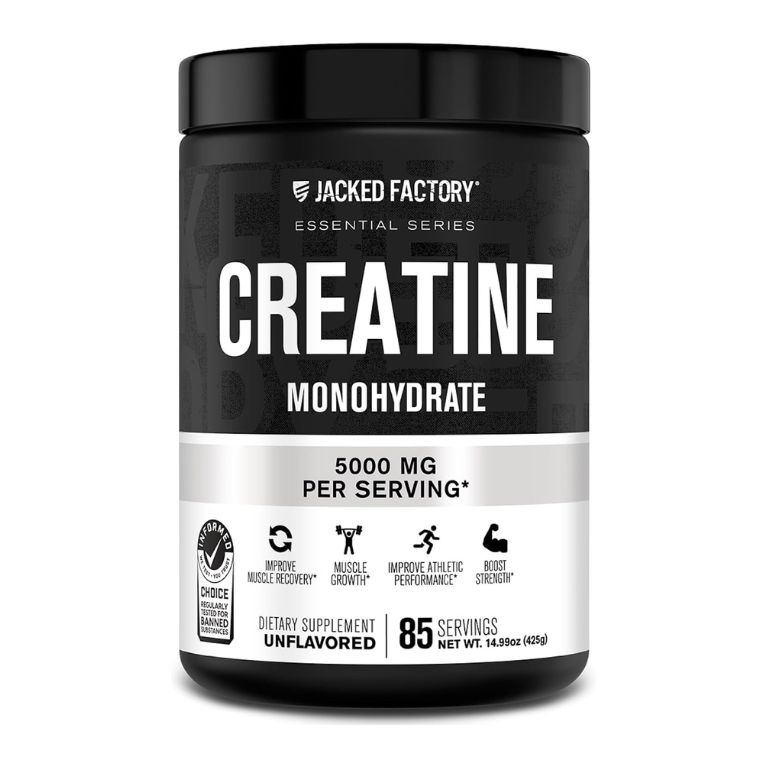
|
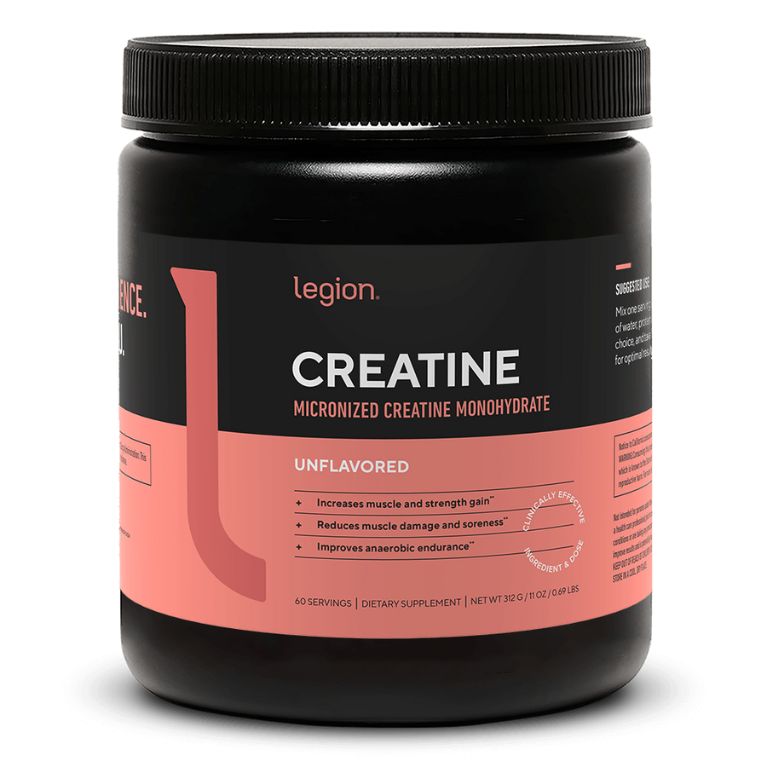
|
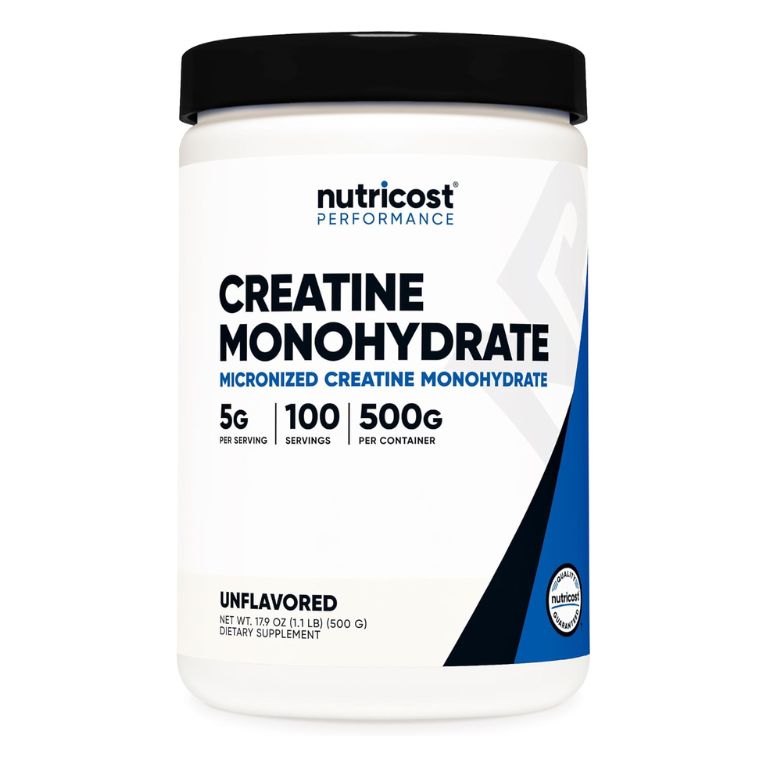
|
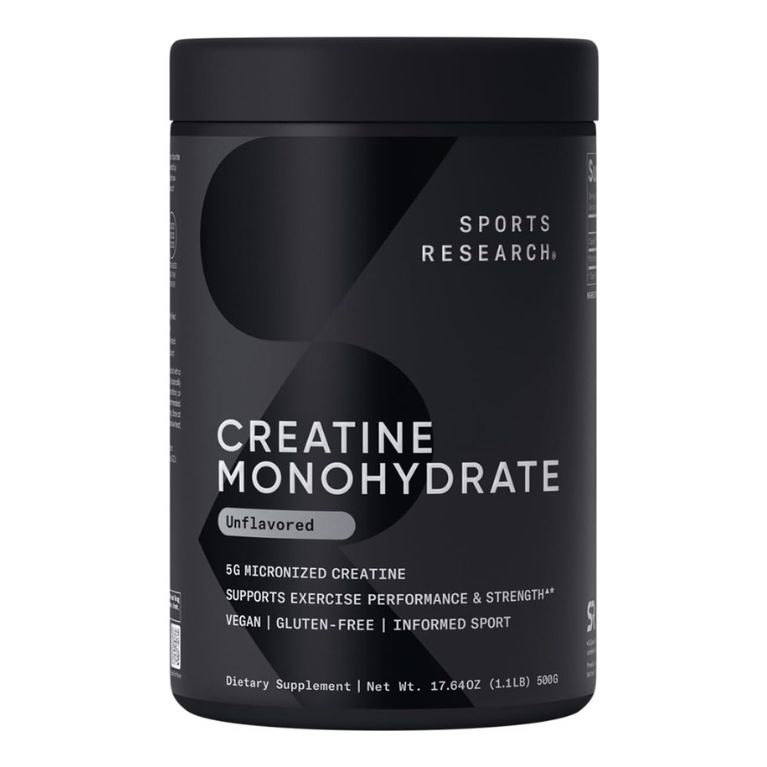
|
|
| Jacked Factory Creatine Monohydrate | Legion Athletics Creatine | Nutricost Creatine Monohydrate | Sports Research Creatine Monohydrate | |
| Rating | ||||
| Cost per serving | $0.35 | $0.50 | $0.33-$0.56 | $0.30 |
| Form | Powder | Powder | Powder | Powder |
| Testing | Informed Choice | Third-party tested | Third-party tested | Informed Sport |
| Key ingredients | Creatine monohydrate | Micronized creatine monohydrate | Micronized creatine monohydrate | Micronized creatine monohydrate |
| Dose | 5 g | 5 g | 5 g | 5 g |
FAQs
Is Jacked Factory creatine good?
Jacked Factory creatine is a good supplement. It has only one ingredient that happens to be the research-backed, gold standard form—creatine monohydrate. (2) The supplement is also dosed right, providing 5 grams of creatine per scoop, the recommended amount for maintaining muscle cell creatine levels. (2)
Is Jacked Factory creatine pure?
Jacked Factory creatine powder is pure. It’s a single-ingredient supplement without food dyes, fillers, or artificial sweeteners. It’s also Informed Choice certified and regularly tested for banned and unsafe substances, and made in a cGMP-certified facility.
However, the Jacked Factory creatine powder isn’t third-party tested for purity and potency. The supplement is made as required by the FDA, but lacks the independent lab test to assure consumers that it contains only creatine monohydrate at the dose indicated on the label. (8)
Does Jacked Factory creatine help build muscle?
Jacked Factory creatine can help build muscle. However, it doesn’t work on its own. In order to build muscle with creatine supplements you must combine it with resistance training.
How much does Jacked Factory creatine cost?
Jacked Factory Creatine Monohydrate powder costs $0.35 per serving. This is well below the average market price for creatine supplements, which is about $0.50 per serving. Given the simplicity and dose of the supplement, Jacked Factory creatine powder is a good value.
These statements have not been evaluated by the Food and Drug Administration. These products are not intended to diagnose, treat, cure, or prevent any diseases.
Our experts
Jillian Kubala, MS, RD
Jillian Kubala is a registered dietitian based in Westhampton, NY. She holds a master’s degree in nutrition from Stony Brook University School of Medicine as well as an undergraduate degree in nutrition science. Jillian uses a unique and personalized approach to help her clients achieve optimal wellness through nutrition and lifestyle changes. In addition to her private practice, Jillian works as a freelance writer and editor and has written hundreds of articles on nutrition and wellness for health publishers such as Healthline, Greatist, Medical News Today, and Health.
Joana Neziri, M.S., NASM CPT
Joana is a writer, editor, and content strategist focusing on nutrition, fitness, and all things health. After earning a master’s degree in business from the University of North Florida, she began a career in research and digital marketing.
Jessica Coulon
Jessica is a contributing editor and writer who specializes in fitness, health, nutrition, and science content. Previously, she was an editor for Popular Mechanics and Bicycling, where she covered pro cycling news, wrote how-to guides, and tested all the latest and greatest bike gear. She was also a regular shoe tester and contributor for Runner’s World. You can often find her skiing or riding her mountain bike, and racing with the F1RE female enduro team.
Kelly Uhler
Kelly has a multifaceted background in elder care, health care, and copywriting. She has worked for organizations such as A Place For Mom and Homecare.com, which gave her the opportunity to work closely with families, providing reliable information to help them make informed decisions about their loved one’s health, safety, and quality of life.

Jill Corleone, RD
Fortune Recommends Nutrition Writer
About Author
Jill’s life has centered around nutrition and fitness for more than two decades. After earning her bachelor of science in nutrition at New York University in Manhattan, Jill went on to complete her internship at the University of Medicine and Dentistry of New Jersey in Newark.
She spent the early part of her career working as a clinical dietitian with a focus on pediatric nutrition. She then transitioned into management. Jill began her career as a freelance writer in 2007 while working as a clinical nutrition manager in Florida. She became a full-time writer in 2010 after the birth of her first child.
Jill has written for numerous publications, including Verywellfit, Diabetes Self-Management, Huffington Post, Livestrong.com, and SFGate.
Sources
- Cooper, R., Naclerio, F., Allgrove, J., & Jimenez, A. (2012). Creatine supplementation with specific view to exercise/sports performance: an update. Journal of the International Society of Sports Nutrition, 9(1), 33. https://doi.org/10.1186/1550-2783-9-33
- Kreider, R. B., Kalman, D. S., Antonio, J., Ziegenfuss, T. N., Wildman, R., Collins, R., Candow, D. G., Kleiner, S. M., Almada, A. L., & Lopez, H. L. (2017). International Society of Sports Nutrition position stand: safety and efficacy of creatine supplementation in exercise, sport, and medicine. Journal of the International Society of Sports Nutrition, 14, 18. https://doi.org/10.1186/s12970-017-0173-z
- Kreider, R. B., Jäger, R., & Purpura, M. (2022). Bioavailability, Efficacy, Safety, and Regulatory Status of Creatine and Related Compounds: A Critical Review. Nutrients, 14(5), 1035. https://doi.org/10.3390/nu14051035
- Kreider, R. B., Jäger, R., & Purpura, M. (2022). Bioavailability, Efficacy, Safety, and Regulatory Status of Creatine and Related Compounds: A Critical Review. Nutrients, 14(5), 1035. https://doi.org/10.3390/nu14051035
- Butts, J., Jacobs, B., & Silvis, M. (2018). Creatine Use in Sports. Sports health, 10(1), 31–34. https://doi.org/10.1177/1941738117737248
- Wu, S. H., Chen, K. L., Hsu, C., Chen, H. C., Chen, J. Y., Yu, S. Y., & Shiu, Y. J. (2022). Creatine Supplementation for Muscle Growth: A Scoping Review of Randomized Clinical Trials from 2012 to 2021. Nutrients, 14(6), 1255. https://doi.org/10.3390/nu14061255
- Ribeiro, F., Longobardi, I., Perim, P., Duarte, B., Ferreira, P., Gualano, B., Roschel, H., & Saunders, B. (2021). Timing of Creatine Supplementation around Exercise: A Real Concern?. Nutrients, 13(8), 2844. https://doi.org/10.3390/nu13082844
- Office of Dietary Supplements. Dietary supplements: What you should know. Accessed September 27, 2024. https://ods.od.nih.gov/factsheets/WYNTK-Consumer/
- Informed Choice. Frequently asked questions. Accessed September 27, 2024. https://choice.wetestyoutrust.com/about/frequently-asked-questions
- Antonio, J., Candow, D. G., Forbes, S. C., Gualano, B., Jagim, A. R., Kreider, R. B., Rawson, E. S., Smith-Ryan, A. E., VanDusseldorp, T. A., Willoughby, D. S., & Ziegenfuss, T. N. (2021). Common questions and misconceptions about creatine supplementation: what does the scientific evidence really show?. Journal of the International Society of Sports Nutrition, 18(1), 13. https://doi.org/10.1186/s12970-021-00412-w
- Kreider, R. B., & Stout, J. R. (2021). Creatine in Health and Disease. Nutrients, 13(2), 447. https://doi.org/10.3390/nu13020447
